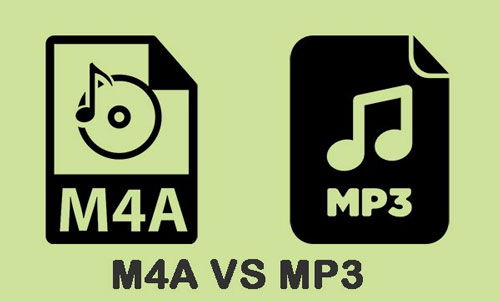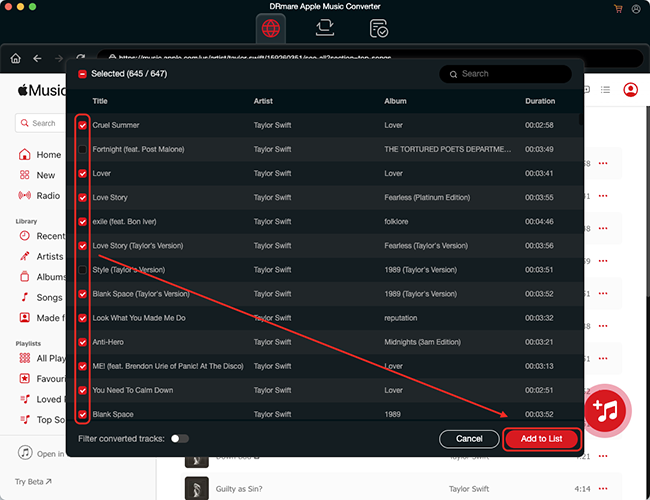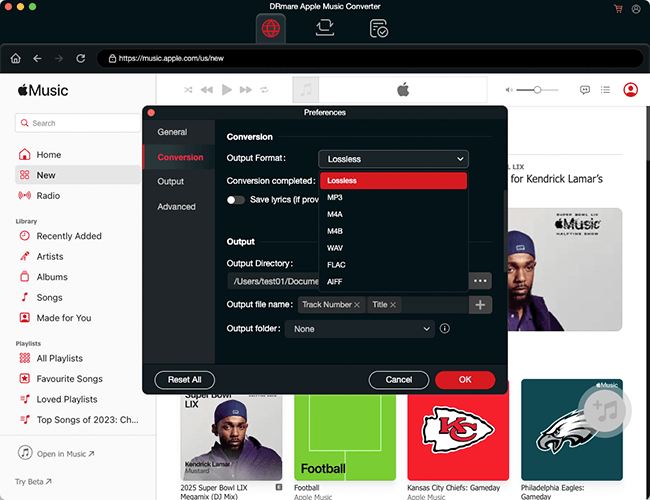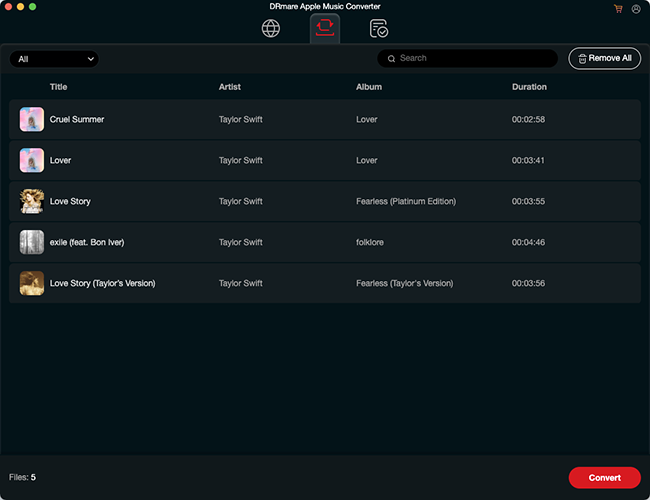Imagine yourself spending weeks making music and now it's finally ready and ready to share with your friends and family but not sure which audio format to make it in? M4A or MP3? What is the difference between M4A and MP3? Or if you are an ultimate music lover who loves collecting albums of your favorite artists but are unable to download the music due to confusion on your system between these two audio formats, then this article will help you understand all of M4A vs MP3.

Part 1. What Is M4A vs MP3
What Is M4A
File extensions: .m4a, .m4b, .m4v
Format type: lossy compression
M4A is an MP3 (MPEG-4) file formed specifically for Apple users. M4A is also known as the successor of the MP3 generation. A variety of audio content types can be stored, including songs, audiobooks, and podcasts.
M4A completely took over the entire Mac-centric compressed audio format and found its place at the birth of the iTunes store, gradually becoming the dominant music format for online music store purchases. Music is encoded using lossy AAC compression, and irrelevant portions of the original audio data are lost during the encoding and decoding process. ALAC compression format is also used in some cases, which can provide higher quality lossless audio tracks while being larger.
However, M4A remains the preferred audio format for distribution on the Mac and iOS App Stores, as well as on Nintendo and PlayStation products. Furthermore, with the rapid development of M4A, it will soon become the preferred format for audio.
Pros:
-
 Its lossless quality ensures users get high-quality music in smaller files
Its lossless quality ensures users get high-quality music in smaller files
-
 You can also use M4A format as your iPhone ringtone collection or rename it to M4R
You can also use M4A format as your iPhone ringtone collection or rename it to M4R
-
 Easily transfer all types of music without any licensing or payment restrictions as it is not protected
Easily transfer all types of music without any licensing or payment restrictions as it is not protected
Cons:
-
 Can only be accessed on a limited number of devices
Can only be accessed on a limited number of devices
-
 At lower bitrates, sound artifacts that are not present in the original audio track may be detected
At lower bitrates, sound artifacts that are not present in the original audio track may be detected
What Is MP3
File extension: .mp3
Format type: lossy compression
MP3 is an uncompressed form of audio format, similar to WAV and AIFF formats. These were the birth of MPEG-2 Audio Layer III, which came about as Internet sharing had become a hype in the mid-1990s and people realized that sending uncompressed files over a dial-up connection was impossible. So, to enjoy good music at the expense of high file size, MP3 is the solution to this huge music sharing problem, with a small file size compared to it. It is a file format that supports pure audio downloading and playback.
Today, MP3 is the most common audio format file in the industry. Additionally, it was introduced into the tech industry before the M4A, also known as Music Only because it was a less developed version compared to the M4A.
MP3 requires a working program's compression algorithms, which help reduce the file size. Additionally, this MP3 format allows Apple users to easily download, save files, and share them freely with other pairable devices.
Pros:
-
 Sharing is accessible on almost every other device except iPhone and iOS
Sharing is accessible on almost every other device except iPhone and iOS
-
 Compression algorithm helps in easy storage
Compression algorithm helps in easy storage
-
 You can download audio files easily
You can download audio files easily
-
 Increasing the bitrate improves quality, but also increases size
Increasing the bitrate improves quality, but also increases size
Cons:
-
 The audio format is not as good as M4A in terms of quality
The audio format is not as good as M4A in terms of quality
Part 2. Differences between M4A vs MP3
Both audio formats are designed to provide an audio-only music experience. However, each format has its pros and cons, and choosing any clear winner would be extremely biased. Because we all know that MP3 was introduced a long time ago and its compression algorithm is supported by multiple platforms. Vice versa, the M4A delivers a premium musical experience, but it's slow to adapt.
Here is a feature-based comparison between MP3 vs M4A:
| Features | M4A | MP3 |
|---|---|---|
| Quality | Better | Compromised |
| File Size | Depends on bitrate, smaller at the same bitrate | Depends on bitrate, larger at the same bitrate |
| Compatibility | Supported by Apple devices | Supported by most devices |
| Release Year | 1997 | 1991 |
Audio Quality:
When comparing MP3 vs M4A audio quality, M4A offers better quality music.
File Size:
There is not that much difference in file size between the two formats as it depends on the bitrate. High bitrate M4A file sizes are relatively large. However, in some cases, M4A can have a smaller file size because it has more efficient compression.
Compatibility:
The M4A doesn't offer simple streaming compatibility. However, MP3 can easily support HLS and MPEG-DASH.
DRM Support:
M4A supports M4P, but does not support DRM support for MP3.
Compression:
M4A and MP3 perform better than M4A due to the technology used.
Compatibility:
MP3 is a popular audio format with almost universal compatibility. And the M4A is not widely supported.
Part 3. How to Convert M4A to MP3 or Vice Versa
To sum up, MP3 is compatible with a wider range of devices and platforms than M4A, while M4A has better sound quality. If you want to convert M4A to MP3, or want to convert MP3 to M4A, DRmare Apple Music Converter can help you.
DRmare Apple Music Converter is an all-in-one audio converter that allows you to convert audio formats between MP3, M4A, M4B, WAV, AAC and FLAC. In addition to these common audio formats, it also supports converting protected music from Apple Music, iTunes, Audible, etc. This smart software maintains lossless sound quality and original metadata to ensure you have a great listening experience. Even better, it supports batch conversion at 30x speed, which is so fast that you don't have to wait too long. Mentioned below are the simplest steps to start converting your favorite songs and share them with anyone for free.
- Unlock protection from Apple Music, iTunes, Audible, etc.
- Convert M4A to MP3, MP3 to M4A, and other audio formats
- Keep lossless sound quality and metadata information
- Support batch conversion with a fast 30X speed
Make sure your audio files are stored in your iTunes music library or computer's local folder. Then just follow the steps below to convert your M4A or MP3 files.
- Step 1Import your M4A/MP3 files

- Download, install, and launch the DRmare Apple Music Converter from your computer. Next, click on the 'Add Files' button at the bottom right to load your MP3 or M4A audio files. You can also directly drag and drop them from your computer's folder or iTunes music library.
- Step 2Change the output audio format

- Click on the 'Format' icon at the bottom right to customize the output audio parameters. You can change the audio format to M4A/MP3. You can also alter the channel, sample rate, bit rate, and more. Then remember to click 'OK' button to complete the settings.
- Step 3Convert M4A to MP3/MP3 to M4A

- Finally, click on the 'Convert' button to start converting your M4A/MP3 files. This software will work at a 30x speed and batch convert all your added audio files immediately. After conversion, please click the 'History' icon or 'Converted' icon to locate and listen to your audio files anywhere.
Conclusion
M4A vs MP3 which is better? M4A files generally provide better sound quality than MP3. However, MP3 files are widely supported by various devices and players. Therefore, which audio format you choose depends on your own needs. If you want to convert MP3 to M4A, or M4A to MP3, DRmare Apple Music Converter can help you a lot. It supports audio conversion between multiple formats, including MP3, M4A, FLAC, and more. It maintains lossless sound quality and ID3 tags, allowing you to enjoy lossless music. Hopefully, these format discussions will help you find the best option and have a great music experience.











User Comments
Leave a Comment